- Home
- Cherie Priest
Fiddlehead Page 3
Fiddlehead Read online
Page 3
Page 3
To his casual delight, his palm was not aerated by bullets.
Over by the printer, his visitors had finally stumbled upon the plaque he’d left behind, which stole their attention at a convenient moment.
“Look at this!”
“What is it?”
“It’s a sign, see? This goddamn piece of junk … it is the Fiddlehead!”
Gideon objected to the “junk” part, but not too strongly, given that these people couldn’t tell a sophisticated calculating device from a relatively mundane printing apparatus. “Idiots,” he mumbled softly as he unscrewed the powder’s lid.
“It’s huge,” one gunman correctly observed.
“Sure is making a lot of noise. ”
While they talked over the printer’s racket, Gideon found an empty measuring glass and filled it with the aluminum powder. Then, with exceptional care, he added the chlorate.
“Don’t worry about it: It’s only noise, not a weapon or nothing. Now where’d that nigger get off to?”
Gideon paused, lifting an eyebrow. “Just for that…” He reached over his head, jabbing his fingers into the cabinet again, this time nabbing a vial of sulfur. With a gentle tap, he dumped the yellow substance into his mix, jostled it oh-so-gently, and turned once more to the map in his mind.
Now he needed a spark.
He considered the printing apparatus. He mentally examined the console and dismissed it, knowing it was too well sealed. The most obvious target was across the room where the wires emerged from the basement. They were hot now, their uninsulated ends casting small fizzes of light all along the switch box.
The printer slowed. Its keys pounded down with less regularity, coming to the end of its instructions, to the very end of the answer Gideon needed … and the room fell quiet.
Even Gideon’s ears were ringing, so he knew how strange the silence must feel to the men who weren’t accustomed to the outstanding drone of the metal keys. Still, he’d have only a few seconds while they shook their heads and found their bearings and a few seconds more than that before their ears calmed down enough to hear the hum of the big machine downstairs.
He couldn’t let them notice.
“You got the dynamite?”
Gideon’s back straightened when he heard that word. He didn’t like it. Should’ve expected it. But would have to work around it now, and analyze the meaning of it later. His brain needed to stay on track, just the one track, which he’d narrowed down from many.
He retrieved the paper, bundling it up under his arm and clamping it against his ribs. He tore off a blank strip from the edge, wadded it into a ball, and used it to stopper the small glass cup.
The sound of tearing paper got the gunmen’s attention again. One of them shouted, “He’s over there!”
But before the words were out of the man’s mouth, Gideon was on his feet. He flung the glass across the room and immediately turned his back, dropping back down behind the table.
His aim was better than the gunmen’s, and his concoction was true. The glass shattered against the fuse panel and the powdered mixture exploded—and the room went blank with fire, a blinding chemical light, and a terrible smell.
It threw a shadow so strong that Gideon squinted, even though he was crouched down on the floor and facing the other direction.
“My eyes! Jesus Christ, my eyes!”
“He had a bomb!”
“Give me your dynamite!”
“I can’t see! I can’t see anything!”
“I can, a little bit—give me your sticks!”
The idea of two half-blind fools playing with dynamite was not the sort of thing to make a man dally, so while the gunmen struggled with their explosives, Gideon seized the trapdoor ladder and withdrew into the unfinished cellar. At the bottom he kicked the final rung, bringing the ladder down with him. If the gunmen wanted to follow him, they could jump and break a leg.
He climbed the steps to the exterior door and unlocked it, shoving it with his upper back. It was heavy, but it wasn’t barricaded from the other side. He knocked it open and stepped out into the crisp November night.
His breath clotted in the air, and the stars looked like ice. He was free, and his unwelcome guests didn’t know it yet.
But had the unwelcome guests brought company?
Gideon gently let the door fall shut behind him.
He stayed close to the building for now, sticking to the shadow of the eaves and hustling toward the front of the old facility, ducking down away from the windows and putting as much distance between himself and the laboratory as possible.
The men had brought dynamite. Their mission was sabotage—and possibly espionage as well, but he didn’t think so. Only seven people had ever seen the Fiddlehead, and none of them could’ve used it if their lives depended on it. Only Gideon could coax it into its calculations. Only Gideon understood it, and there were days when even he was stunned by what it could do. No, even if someone, somewhere knew precisely what the device was for … there wasn’t another scientist in the world who could operate it. He would’ve bet his life on it.
Therefore, whoever sent the men didn’t want to use the Fiddlehead. They wanted to destroy it.
Behind him, a blast shook the night—a terrible percussion that rocked the building and made the earth beneath his feet rumble unsteadily, like the ground might open up and swallow him. He staggered forward, adjusting for the quake and hunkering as he moved, bracing himself against the shingles and other bits of small debris that followed him.
When the last of it had settled, he heard nothing. Not the two men talking, not anyone chasing after him. Not even his own feet as he started to run.
Eventually his hearing caught up to him, and his head echoed with a high-pitched hum. He shook it, trying to cast the buzz out of his ears like so much water after a swim. The hum wavered but stayed, keeping him company as he cut across the lawn, past an old fountain that had been dry for decades. He turned through an overgrown gate, pushing past the vines that knitted the old garden exit shut, stumbling briefly as his boots tangled in a brittle patch of rose briars.
Past the garden and into the woods he went, though the woods were almost too swampy to call them that. His feet splashed through puddles left by the recent rains, and the half-frozen water soaked between his toes. He held the papers up high, sometimes over his head if he was afraid of falling.
The woods thinned quickly and gave way to a road with two wide lanes and intermittent traffic. Some of the carriages and carts boasted those new combustion engines that were all the rage. Gideon liked the noise of engines more than he liked the chatter of people or the whinnies of horses, even though it all meant the same thing: civilization. Some element of safety, he supposed, assuming that no one intended to murder him in front of witnesses. And how likely was that? He couldn’t say.
He crossed the road, letting the traffic flow between him and the hospital. Here and there, over the dull ringing in his ears, he heard people asking one another what that loud sound might have been—Was it an explosion, do you think? Was it artillery?—for the D. C. population always had a good reason to be nervous. Now more than ever, he supposed, when Southern spies with dynamite were running about, blowing up advanced technology willy-nilly.
With a bit of distance from the hospital, Gideon played the scene over in his head one second at a time, examining every detail as he walked a road he usually traversed in a horseless carriage belonging to Mary Todd Lincoln and driven by his old friend Harrison.
As he hiked, he reviewed his information. He assessed the details and considered the motives.
The intruders had absolutely planned to kill him. Why destroy the Fiddlehead only to let its creator survive to build another one? Men who didn’t know what such a machine could do probably wouldn’t know how preposterous the idea was: Gideon could build another Fiddlehead, yes, but not without a vast
sum of money and several years at his disposal. His life’s work could not be conjured back into existence with the blink of an eye, but it could be conjured eventually.
So, yes, his life was in danger—that much was certain. But in danger from whom? He had assumed that the saboteurs were Southerners, but upon reflection that may not be correct. Regional accents were dead giveaways, in Gideon’s experience, and although one of the men might have come from the South, the other one was definitely a northeastern coastal resident.
Mind you, a Northerner still could’ve been hired by the CSA. Allegiances shifted across state lines every day, and mercenary loyalties came with price tags, not regional fidelity.
He couldn’t be sure. This made him unhappy, because he liked to be sure at all times, of as many things as possible. It made for better plans.
That having been said, he was sure that it was well over two miles back to the Lincoln house. His feet were cold and wet and he didn’t want to walk, but there wasn’t much choice. He had no immediate means of contacting anyone, and he carried no money for the purposes of flagging down a carriage and buying a ride.
He disliked money on general principle. It had its uses, but it seemed insubstantial—entirely too false. Little more than a promise on a piece of paper, written by dead men, miles and years away. Paper could burn, and paper could lie.
But the paper under his arm did not lie. It crinkled and crackled, urging him onward. Reminding him of what was at stake.
One foot in front of the other, he trudged along the road’s edge, every step leaving his toes a bit more numb. It wasn’t late, and the night still had room to get much colder; everything might freeze, he thought. If there was one single, solitary thing he missed about southern Alabama, it was the unimpressive winter weather.
(He missed it only fleetingly, and with some private disgust. )
There was never any question of where he might go now.
Home? Certainly not. It was even farther away than the Lincolns’ house at the edge of Capitol Hill. Besides, what would he do there? Sleep? Wait for morning, for a more reasonable hour to demand an audience?
He wished he had a bag or a satchel to hold the papers. Every few yards he adjusted them, squishing the unspooled document tighter and making sure nothing trailed on the ground behind him. He didn’t know how much he’d lost to the intruders’ interruption. Every surviving line was more precious than diamonds, but the cumbersome bundle drew stares from drivers and passengers, and from the men and women on their own trips home from a factory shift or an evening’s meal on the town.

 Maplecroft
Maplecroft Chapelwood
Chapelwood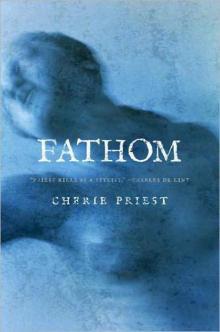 Fathom
Fathom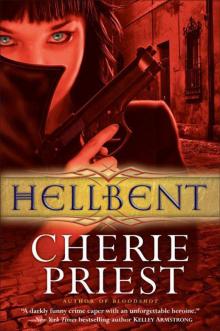 Hellbent
Hellbent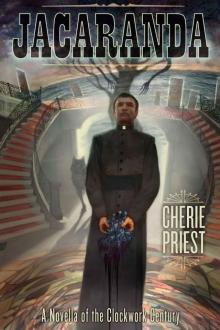 Jacaranda
Jacaranda Four and Twenty Blackbirds
Four and Twenty Blackbirds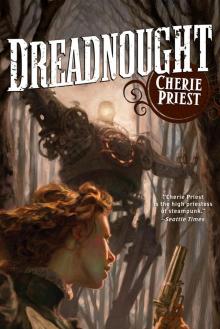 Dreadnought
Dreadnought Dreadful Skin
Dreadful Skin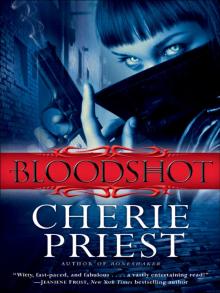 Bloodshot
Bloodshot Tanglefoot
Tanglefoot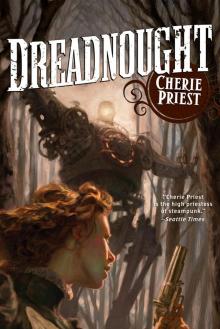 Clementine
Clementine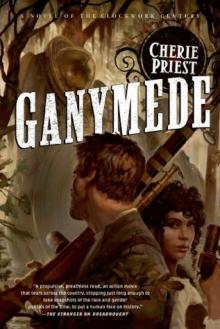 Ganymede
Ganymede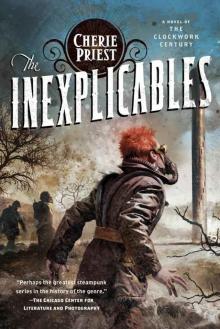 The Inexplicables
The Inexplicables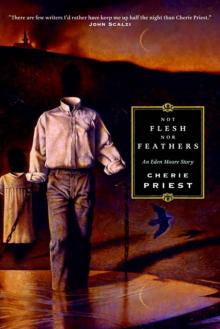 Not Flesh Nor Feathers
Not Flesh Nor Feathers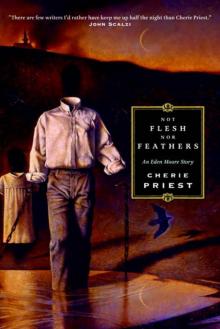 Wings to the Kingdom
Wings to the Kingdom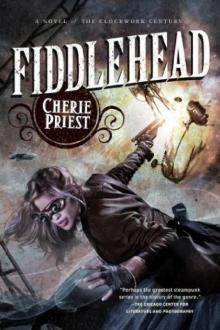 Fiddlehead
Fiddlehead Tanglefoot: A Story of the Clockwork Century
Tanglefoot: A Story of the Clockwork Century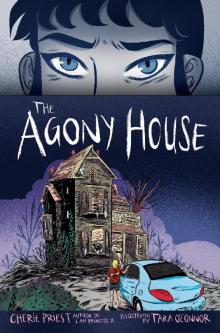 The Agony House
The Agony House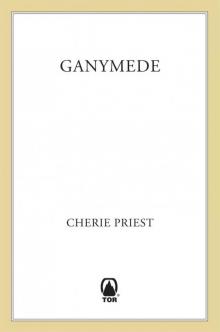 Ganymede (Clockwork Century)
Ganymede (Clockwork Century)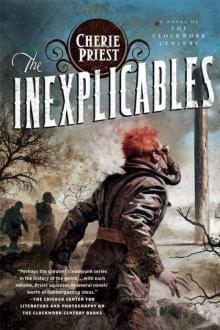 The Inexplicables (Clockwork Century)
The Inexplicables (Clockwork Century)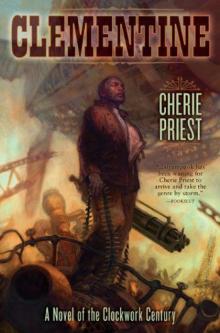 Clementine tcc-2
Clementine tcc-2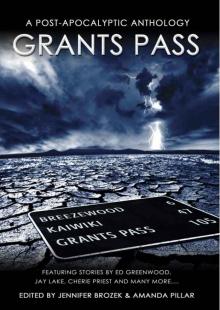 Grants Pass
Grants Pass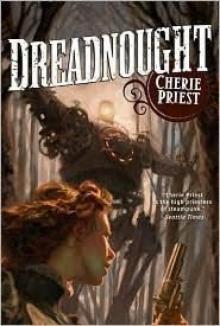 Dreadnought tcc-3
Dreadnought tcc-3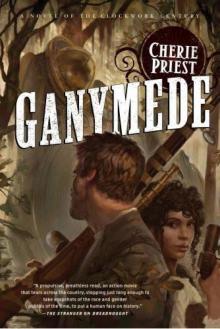 Ganymede tcc-4
Ganymede tcc-4